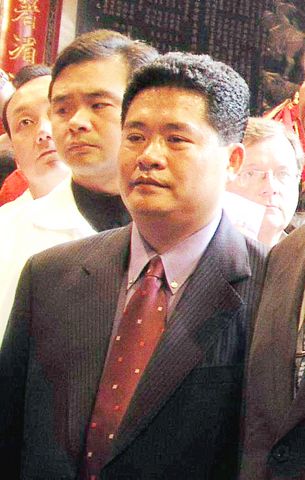The deputy chairman of the Jenlan Temple (
"Police suspect that the Lin Ming-wha (
He said police did not believe that notorious fugitive gangster Chang Hsi-ming (

PHOTO: WANG YI-CHE, TAIPEI TIMES
Although Cheng's family was rumored to have paid a NT$25,000,000 (US$800,000) ransom, the family denies paying any such fee, the police said.
Cheng told police that the kidnappers did not abuse him. They gave him food, and let him take a shower several times during the 10-day ordeal. Tsai said Cheng is in good health.
According to police, late on the night of June 1, Cheng left his residence by scooter to go visit friends. Twenty minutes later, Cheng's wife received a phone call from one of the kidnappers, asking for a NT$100 million ransom payment.
Police said that after receiving immediate notification from the family, they found Cheng's scooter knocked over on a road near his residence.
Cheng told police a car intentionally hit him, and that kidnappers than put him in the car and took him to a house. He was kept tied up -- with his eyes and mouth covered -- for most of the next 10 days.
Cheng told police the kidnappers told him to pay up his debt of NT$8 million, but Cheng responded that he didn't owe anyone money.
On Friday night, Cheng was driven by car to Kaohsiung County and released. Cheng went home yesterday morning by himself.
Local newspapers said Cheng and Yen Ching-piao (顏清標), the chairman of Jenlan Temple in Tachia, Taichung County and also a legislator, have a very close relationship.
Both Yen and Cheng have criminal records. They were charged with forgery and breach of trust for misappropriating property from Jenlan Temple, and the case is still under investigation.
Local newspapers said that during the kidnapping, Yen and another unidentified person tried to bypass the police in order to communicate directly with the kidnappers.
Chinese-language newspapers have alleged that they tapped gang connections to rescue Cheng. Cheng's family paid a ransom, but they did not want police to investigate, because shady business disputes may have been connected to the kidnapping, the reports said.
One report said that police were bothered by the way "gang members dealt with other gang members."

CHANGING LANDSCAPE: Many of the part-time programs for educators were no longer needed, as many teachers obtain a graduate degree before joining the workforce, experts said Taiwanese universities this year canceled 86 programs, Ministry of Education data showed, with educators attributing the closures to the nation’s low birthrate as well as shifting trends. Fifty-three of the shuttered programs were part-time postgraduate degree programs, about 62 percent of the total, the most in the past five years, the data showed. National Taiwan Normal University (NTNU) discontinued the most part-time master’s programs, at 16: chemistry, life science, earth science, physics, fine arts, music, special education, health promotion and health education, educational psychology and counseling, education, design, Chinese as a second language, library and information sciences, mechatronics engineering, history, physical education

DEADLOCK: As the commission is unable to forum a quorum to review license renewal applications, the channel operators are not at fault and can air past their license date The National Communications Commission (NCC) yesterday said that the Public Television Service (PTS) and 36 other television and radio broadcasters could continue airing, despite the commission’s inability to meet a quorum to review their license renewal applications. The licenses of PTS and the other channels are set to expire between this month and June. The National Communications Commission Organization Act (國家通訊傳播委員會組織法) stipulates that the commission must meet the mandated quorum of four to hold a valid meeting. The seven-member commission currently has only three commissioners. “We have informed the channel operators of the progress we have made in reviewing their license renewal applications, and

The High Prosecutors’ Office yesterday withdrew an appeal against the acquittal of a former bank manager 22 years after his death, marking Taiwan’s first instance of prosecutors rendering posthumous justice to a wrongfully convicted defendant. Chu Ching-en (諸慶恩) — formerly a manager at the Taipei branch of BNP Paribas — was in 1999 accused by Weng Mao-chung (翁茂鍾), then-president of Chia Her Industrial Co, of forging a request for a fixed deposit of US$10 million by I-Hwa Industrial Co, a subsidiary of Chia Her, which was used as collateral. Chu was ruled not guilty in the first trial, but was found guilty

Taiwan People’s Party (TPP) Chairman Huang Kuo-chang (黃國昌) yesterday appealed to the authorities to release former Taipei mayor Ko Wen-je (柯文哲) from pretrial detention amid conflicting reports about his health. The TPP at a news conference on Thursday said that Ko should be released to a hospital for treatment, adding that he has blood in his urine and had spells of pain and nausea followed by vomiting over the past three months. Hsieh Yen-yau (謝炎堯), a retired professor of internal medicine and Ko’s former teacher, said that Ko’s symptoms aligned with gallstones, kidney inflammation and potentially dangerous heart conditions. Ko, charged with